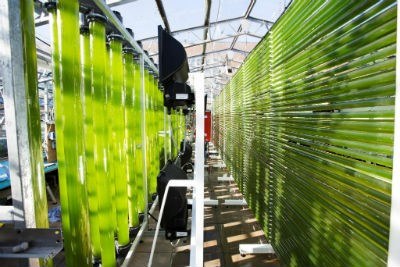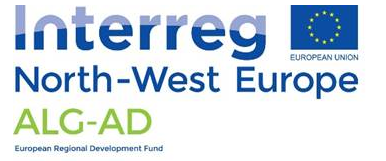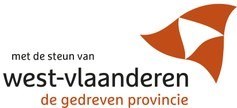Interreg North West Europe - ALG-AD
© Swansea University
Introduction
ALG-AD (Creating value from waste nutrients by integrating algal and anaerobic digestion technology) will cooperatively develop integrated algal-AD technology as a novel eco-innovation solution that uses nutrient waste resource to generate products. The ALG-AD project brings together 11 partners from 4 European countries. The project is coordinated by Swansea University (contact via Carole Llewellyn) and will run from 20/09/2017 until 31/03/2021.
Description
The ALG-AD project addresses reuse of waste to generate products for a sustainable economy, reducing pollution risk and dependence on imported material resources. NWE, a densely populated intensive agricultural area, contributes disproportionately to food and farm waste produced in the EU each year. To reduce food and farm waste, anaerobic digestion (AD) is used (2000 AD facilities in NWE). AD converts waste to biogas energy and a liquid nutrient-rich digestate (NRD). Each AD plant produces 4,000-70,000t/y of NRD (2-6 kg nitrogen/t NRD). Most NRD is returned to land as a biofertilizer. However, strict limits are imposed with Nitrate Vulnerable Zones (NVZs - European Nitrate Directive 91/676/EEC), restricting return of NRD to land to prevent eutrophication pollution. Much of NWE land falls within NVZs (58% in UK; 100% in Brittany & Flanders), creating an excess NRD. Dealing with excess NRD is an acute worsening issue and solutions are needed.
ALG-AD provides a solution combining algal and AD technology to reduce and reuse NRD, converting nutrients to create algal biomass for sustainable animal feeds. Technology will be collaboratively implemented and tested in 3 distinct ‘real-life conditions’ in Devon (UK), Brittany (FR) and Flanders (BE). Sites reflect the heterogeneity of NWE from ‘predominantly rural remote’ to ‘predominantly urban’ (OECD 2011) and use different types of biodegradable waste in different regulatory landscapes. Demonstration to stakeholders and Decision Support Tools will enable take-up.
Objectives
These are the objectives of ALG-AD:
• Build and commission 3 facilities to test an efficient materials resource solution in different conditions
• Increased material recovery and re-use
• Generation of a decision support toolset
Role of Ghent University
• The Laboratory of Analytical Chemistry and Applied Ecochemistry (UGhent-Ecochem) will focus on digestate compositions and necessary pretreatment/conditioning for algae cultivation
• In association with InnoLab, UGhent-Ecochem will work on realization and operation of Investment 3 (I3), and share their experience with investments (I1 and I2) in UK and France
• Via subpartner (EBA), UGhent-Ecochem will provide outreach to & interlinkage with biogas sector in NW Europe
• UGhent-Ecochem will use its extensive network on AD working with UBO, ANSES, Feed Design Lab and Cooperl to reach out to the agro-industry and farmers and feed producers
Dutch summary
ALG-AD zet in op hergebruik van afval om producten te maken voor een duurzame economie, met reductie van milieuverontreiniging en import (Uitdaging 3). NWE is een dichtbevolkte regio, die buitenproportioneel bijdraagt aan voedsel- & landbouwafval. Om dit te verwerken wordt anaerobe vergisting (AD) gebruikt (2000 installaties in NWE). AD zet afval om tot biogas energie en een vloeibaar nutriëntrijk digestaat (NRD). Elke AD installatie produceert 4.000-70.000 t/j NRD (met 2-6kg/t stikstof). Het meeste NRD wordt op land afgezet als bemester. Echter, strenge limieten zijn opgelegd in Nitraat gevoelige zones (NVZ; Nitraat richtlijn 91/676/EEC) waarbij afzet op land beperkt wordt om verontreiniging te vermijden. Veel van NWE gebied valt in de NVZ gebied (58% van VK; 100% van Brétagne en Vlaanderen) waardoor een overmaat aan NRD wordt geproduceerd. Een duurzame behandeling van NRD dringt zich op en oplossingen zijn vereist. ALG-AD voorziet een oplossing door alg- & AD technologie te combineren om NRD te reduceren en om nutriënten om te zetten naar algenbiomassa voor duurzame veevoeders. De technologie zal gemeenschappelijk geïmplementeerd worden in 3 unieke praktijk omstandigheden in Devon (VK), Brétagne (FR) en Vlaanderen (BE). De sites reflecteren de heterogeniteit van NWE van ‘overwegend afgelegen ruraal’ tot ‘hoofdzakelijk stedelijk’ (OECD 2011); verschillende types biodegradeerbaar afval alsook verschillende wettelijke kaders. Demonstratie naar doelgroepen en beslissingsondersteunde instrumenten zullen marktopname faciliteren.
Website
Interreg NWE ALG-AD
Biorefine ALG-AD
Contact
Prof. Dr. ir. Erik Meers
Department of Green Chemistry and Technology
Phone number: 0032 9 264 60 94
E-mail
This project has received funding from the Interreg North West Europe programme 2014-2020 co-funded by the European Regional Development Fund and the Province of West Flanders.


